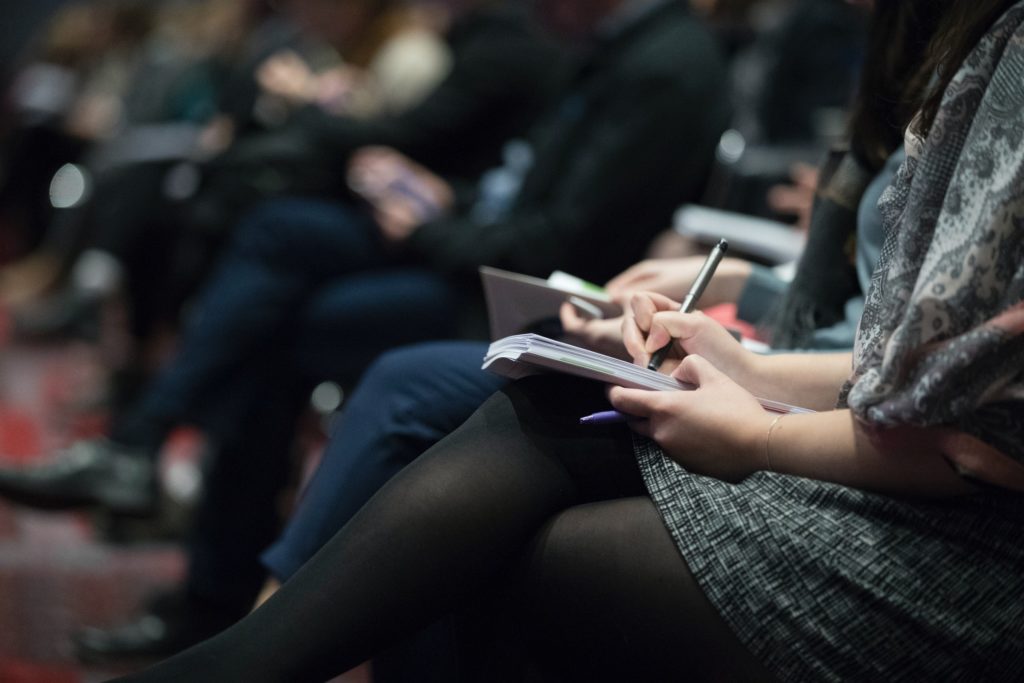Grace Hopper Celebration: a place of our own
 Photo credit: The Climate Reality Project on Unsplash
Photo credit: The Climate Reality Project on Unsplash Every year, tech and computer gatherings occur across the world, bringing thousands of name-tag-wearing coders and engineers to places like Silicon Valley and Las Vegas, where brightly lit convention centers boast the latest and greatest in groundbreaking technology. But there’s one conference where the attendees have even more in common than the latest smartwatches. Now in its 28th year, the annual Grace Hopper Celebration has a mission to support women at all levels of their STEM careers, whether they are just beginning to explore the possibilities that lie beyond graduation; thinking about making a mid-career change; or hoping to pass on valuable experiences and insights gleaned from a full career.
Jeanne Harabedian MEng ‘22 attended the Grace Hopper Conference virtually, but found the experience expanded her view of the possible outcomes her degree could give her. We sat down with her to learn more.
What surprised you or contradicted your expectations about the Grace Hopper Conference?
Since it was virtual, I didn’t know what to expect in terms of structure, but from a content perspective I knew there would be a career fair, talks from women in STEM, group sessions and presentations. The thing that surprised me in the group learning and talking sessions was the really wide range of ages and experiences. I expected that the real “adults” there would be the ones running the conference, not mixed into the audience. However, there were people with a lot of professional experience totally immersed in the learning sessions and talks—not just giving the presentations. People of all ages were asking questions, getting and giving advice, having really natural discussions. One person in particular that I talked to was really late in her career, who’d been doing project management for most of her life. She came to Grace Hopper to continue learning from others but to also be a sounding board and give advice to young / new professionals, like me. The combination of students, early career professionals, and highly experienced professionals who all come to Grace Hopper create an extremely unique and effective space for learning about career development.

As an early-career participant, the Grace Hopper is at least as much about exploring possibilities and networking as about presenting work. Did any of the talks or panels you viewed, or people you met, spark curiosity about a new possible direction for you?
100 percent. I went to Grace Hopper with the motivation of exploring those opportunities and finding new things. I’d just gone through a type of mental breakdown where I was like, I don’t think I want to do engineering, but I don’t want to leave tech, so it was a really good time to do some job searching and find out what else is out there. All my internships had been in EE and I was actively doing research for my EE MEng degree and thesis, but I started to realize that EE as a career path might not be best suited for me. However, I still loved tech and loved everything I had learned through my engineering degrees, so I went to the conference with an extremely open mindset about how I could still incorporate a passion for tech into a career that is not strictly engineering. I went to a talk about the software engineering required for the low-latency trading systems at Goldman Sachs, which blew my mind. It was such a cross-disciplinary topic, and the woman presenting was the project lead for it. There are so many applications of everything that we learn at MIT, and so many different directions that you can take the same knowledge and apply it in different ways. I had a realization, while I was at Grace Hopper, that I needed to get more exposure and see what other women in STEM are doing.
What would you tell someone attending for the first time?
Do your research beforehand. Figure out who and what’s going to be there—you only have so many people and companies you can talk to and learn from, so planning beforehand can help a lot. Not in the sense of thinking you know exactly what you want, but in the sense of figuring out how to best spread across the range of experiences and industries, and cover as many bases as possible. I talked individually with both more experienced people, and people who were only a year older than me that had just graduated and started working. Each person that you talk to will offer up different advice depending on their experiences (or lack thereof). An experienced professional might share advice on how to switch career paths or tips for being an effective team leader. But an early-career person might give direct advice on how to look and apply for jobs, or how they negotiated their job offers. Each person has different experiences and brings different pieces of advice to the table, so figuring out who is going to be there and what information you can gain from each person beforehand will be extremely effective during the conference.
Also, everyone attending the conference was SO nice! If you expressed the tiniest bit of interest in learning more outside the group discussion, every single person was like, here’s my Zoom link, let’s chat in 15 minutes. So that ties back to doing your research: if you have a specific person you want to meet and chat with and ask a question, it’s almost a guarantee they’ll say yes, because that’s the way everyone is there.
If you’re an MIT student interested in learning how to attend the Grace Hopper Conference, contact Undergraduate Program Manager Ellen Reid at ellenr@mit.edu . Financial assistance may be available; this opportunity to meet and learn from women technologists and explore career paths including those in academia has been made possible through a generous donation from The Queen’s Road Foundation, a non-profit foundation focused on supporting a range of programs in arts and science education.
Media Inquiries
Journalists seeking information about EECS, or interviews with EECS faculty members, should email eecs-communications@mit.edu.
Please note: The EECS Communications Office only handles media inquiries related to MIT’s Department of Electrical Engineering & Computer Science. Please visit other school, department, laboratory, or center websites to locate their dedicated media-relations teams.